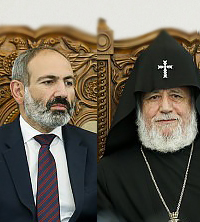
There are different opinions about the change of power in Armenia in 2018. Some see it as a revolution because a change of government had taken place not through elections but by pressure from the masses. Some believe that despite this fact, in order for a change of government to be considered a revolution, there had to be a turning point in the country, especially in terms of the value system, changes in the constitution and a number of laws, and so on. In short, all views have their strengths and weaknesses. However, we will only touch upon church-state relations.
From the very first day, the relations between the Armenian Apostolic Church and the new authorities have been problematic. The “revolutionary” masses, for whom the former government was associated with the church because the church supported the government at the time, and the government, in turn, sought to increase its public legitimacy by supporting the church, hence they perceived the church and especially the Catholicos as remnants of the past authorities.
If the representatives of the new government sometimes sharply criticize the Catholicos, even spiced with personal insults, the Catholicos is in the role of the defender and tries to be in the public eye as little as possible. Today, church-state relations can be described as “cold war” or rather “cold peace.” In other words, each of them goes their own way and tries not to interfere in each other’s affairs.
The “cold peace” was recently thwarted by the Catholicos’ statement on April 14, in which he spoke about the pre-trial detention of the second president of Armenia, Robert Kocharian, who was imprisoned in connection with the trial over the legitimacy of the state of emergency during mass protests of 2008: “Being aware of the professional opinions of doctors regarding the president’s health, we consider it necessary to take all preventive measures and undertakings, including the change of the restraining measure, along with the implementation of justice, to insure him against further complications of the health condition during this period.”
Robert Kocharian’s trial has become a matter of political importance for the current government. Catholicos’ call to change the measure of Kocharian’s restraint, ie to release him from prison until the end of the trial, was accepted by the current government as an attempt by the church to interfere in politics.
The complexity of the tense church-government relations, which has been been lingering on since 2018, has entered a new phase, spiced with mutual personal insults, expressed by the NA Deputy Speaker, the Chairman of the Public Council and other supporters of the “revolution” on one side, and by the clergymen and opposition representatives on the other side.
In a heated atmosphere, everyone forgot about the principles of church-state relations, their institutional bases.
The Armenian Church has a problem of reform, which is obvious. In general, all modern churches have this problem. Modern life is changing rapidly, and there are few institutions that are able to respond to these changes with such speed, especially traditional and conservative structures like churches. On the other hand, the new authorities have not come up with any conceptual solutions to this issue during their two years in power. Moreover, the issue of amending the Law on Freedom of Conscience, which was adopted in 1991 and is eventually no longer in force, is not even on the agenda.
In fact, the whole issue of “church-state” relations is decided by the debate on Robert Kocharian’s restraining measure. This proves that the current government does not have a conceptual approach to this issue, like on many other similar issues.